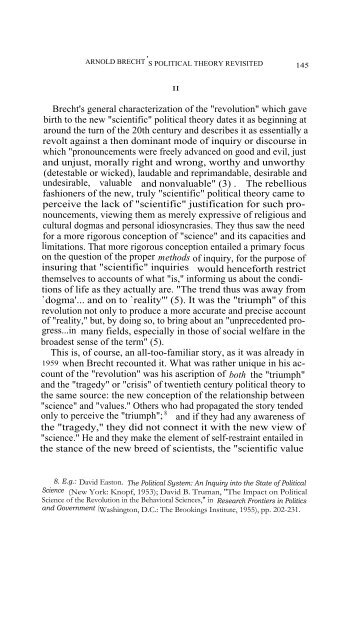ARNOLD BRECHT'S POLITICAL THEORY REVISITED Political ...
ARNOLD BRECHT'S POLITICAL THEORY REVISITED Political ...
ARNOLD BRECHT'S POLITICAL THEORY REVISITED Political ...
Create successful ePaper yourself
Turn your PDF publications into a flip-book with our unique Google optimized e-Paper software.
<strong>ARNOLD</strong> BRECHT ' S <strong>POLITICAL</strong> <strong>THEORY</strong> <strong>REVISITED</strong> 145<br />
II<br />
Brecht's general characterization of the "revolution" which gave<br />
birth to the new "scientific" political theory dates it as beginning at<br />
around the turn of the 20th century and describes it as essentially a<br />
revolt against a then dominant mode of inquiry or discourse in<br />
which "pronouncements were freely advanced on good and evil, just<br />
and unjust, morally right and wrong, worthy and unworthy<br />
(detestable or wicked), laudable and reprimandable, desirable and<br />
undesirable, valuable and nonvaluable" (3) . The rebellious<br />
fashioners of the new, truly "scientific" political theory came to<br />
perceive the lack of "scientific" justification for such pronouncements,<br />
viewing them as merely expressive of religious and<br />
cultural dogmas and personal idiosyncrasies. They thus saw the need<br />
for a more rigorous conception of "science" and its capacities and<br />
limitations. That more rigorous conception entailed a primary focus<br />
on the question of the proper methods of inquiry, for the purpose of<br />
insuring that "scientific" inquiries would henceforth restrict<br />
themselves to accounts of what "is," informing us about the conditions<br />
of life as they actually are. "The trend thus was away from<br />
`dogma'... and on to `reality"' (5). It was the "triumph" of this<br />
revolution not only to produce a more accurate and precise account<br />
of "reality," but, by doing so, to bring about an "unprecedented progress...in<br />
many fields, especially in those of social welfare in the<br />
broadest sense of the term" (5).<br />
This is, of course, an all-too-familiar story, as it was already in<br />
1959 when Brecht recounted it. What was rather unique in his account<br />
of the "revolution" was his ascription of both the "triumph"<br />
and the "tragedy" or "crisis" of twentieth century political theory to<br />
the same source: the new conception of the relationship between<br />
"science" and "values." Others who had propagated the story tended<br />
only to perceive the "triumph"; 8<br />
and if they had any awareness of<br />
the "tragedy," they did not connect it with the new view of<br />
"science." He and they make the element of self-restraint entailed in<br />
the stance of the new breed of scientists, the "scientific value<br />
8. E.g.: David Easton. The <strong>Political</strong> System: An Inquiry into the State of <strong>Political</strong><br />
Science (New York: Knopf, 1953); David B. Truman, "The Impact on <strong>Political</strong><br />
Science of the Revolution in the Behavioral Sciences," in Research Frontiers in Politics<br />
and Government (Washington, D.C.: The Brookings Institute, 1955), pp. 202-231.
















